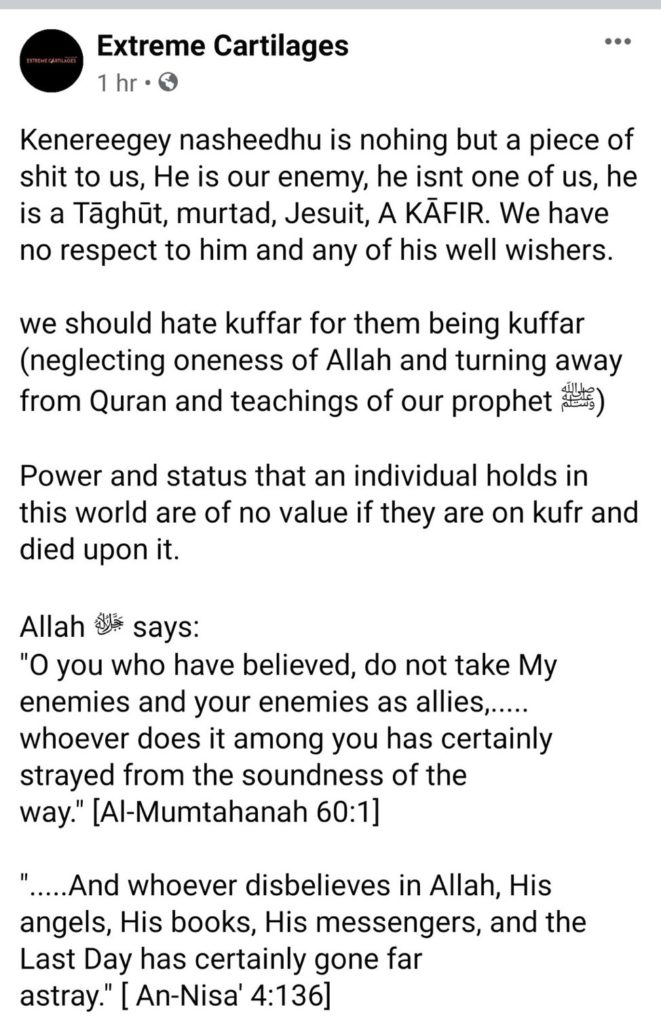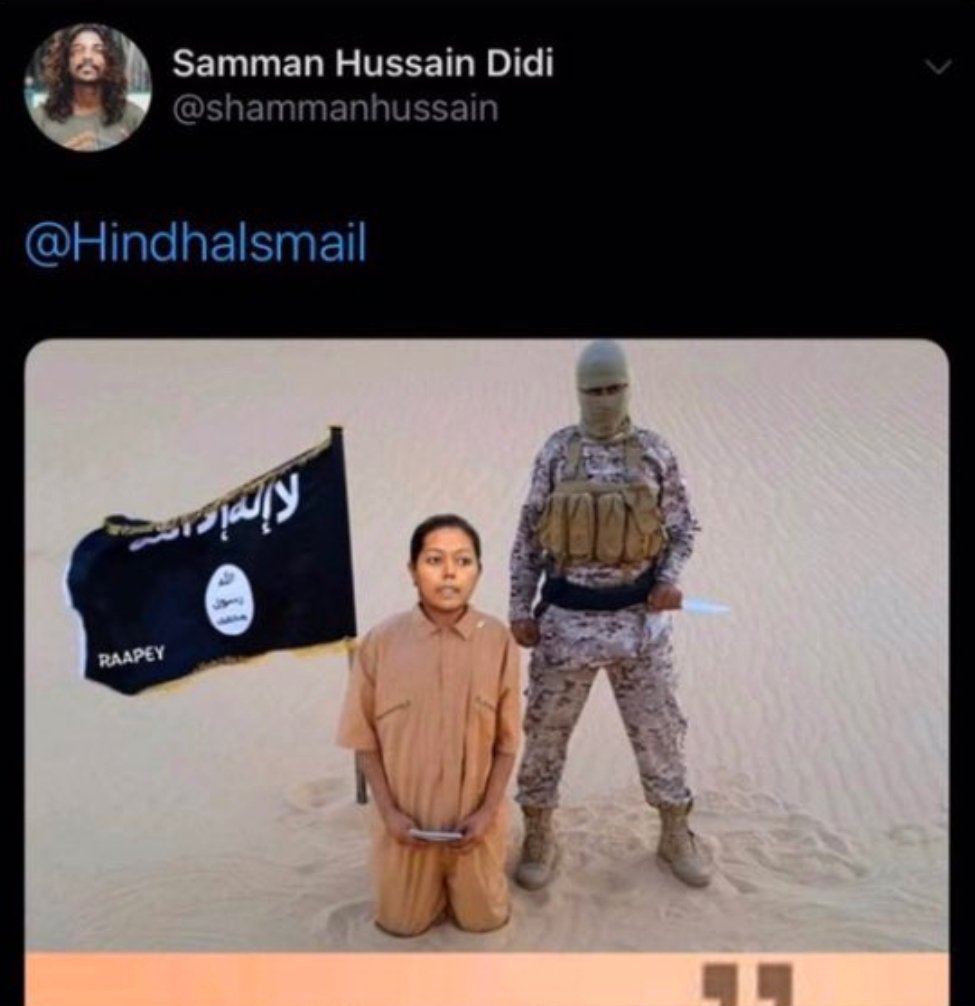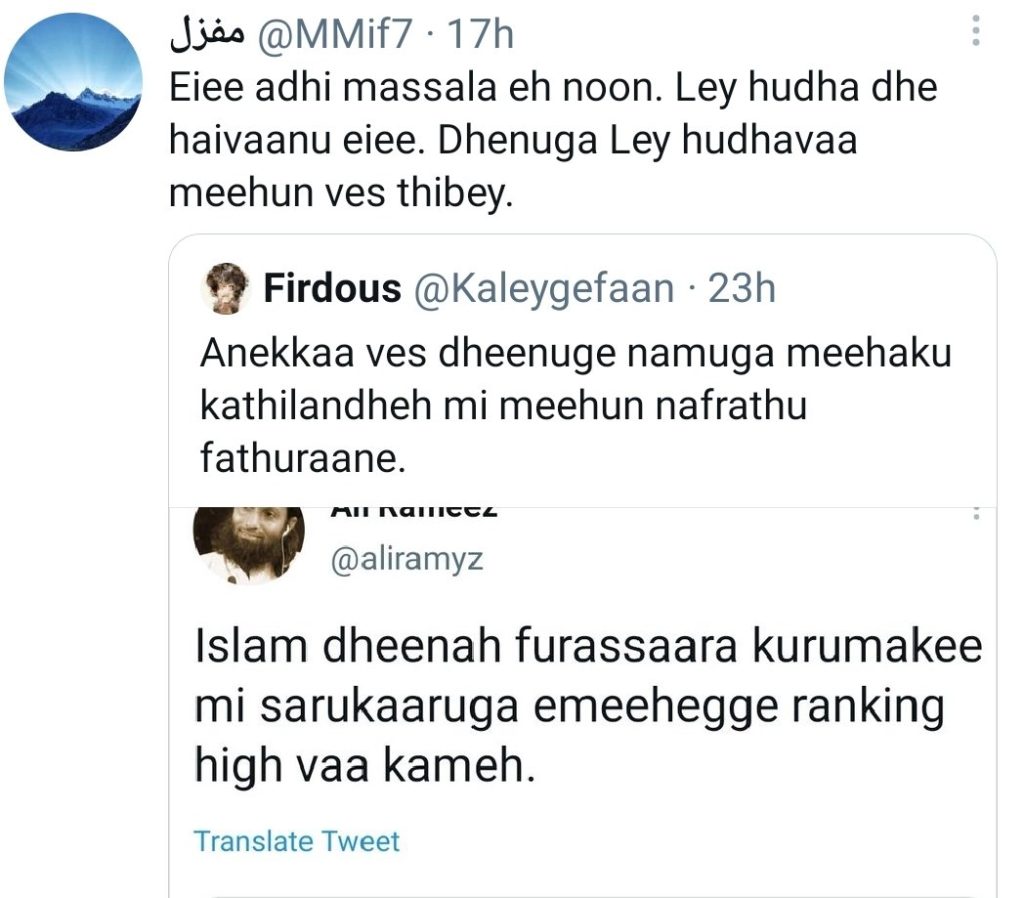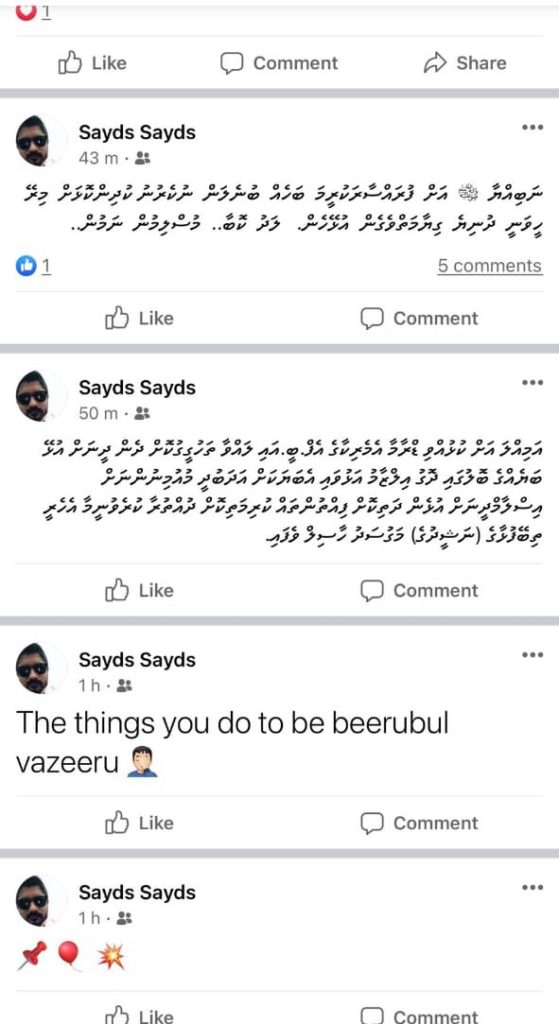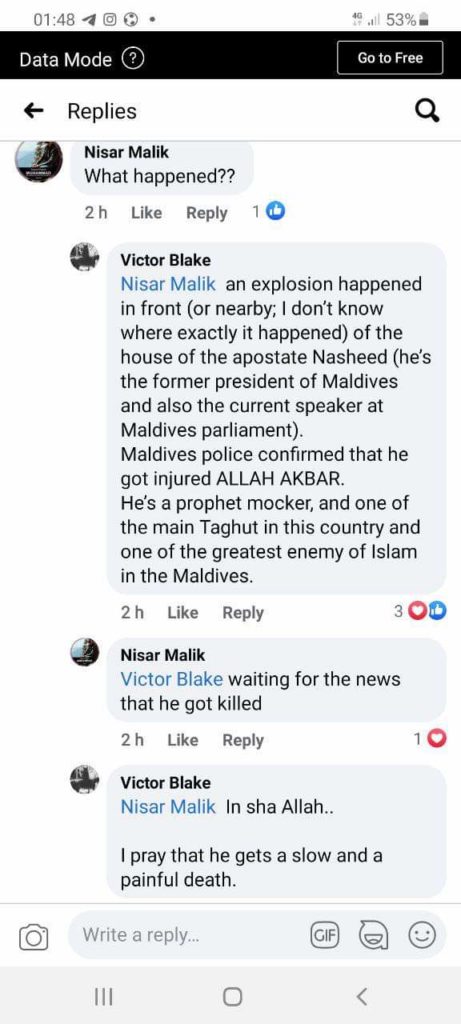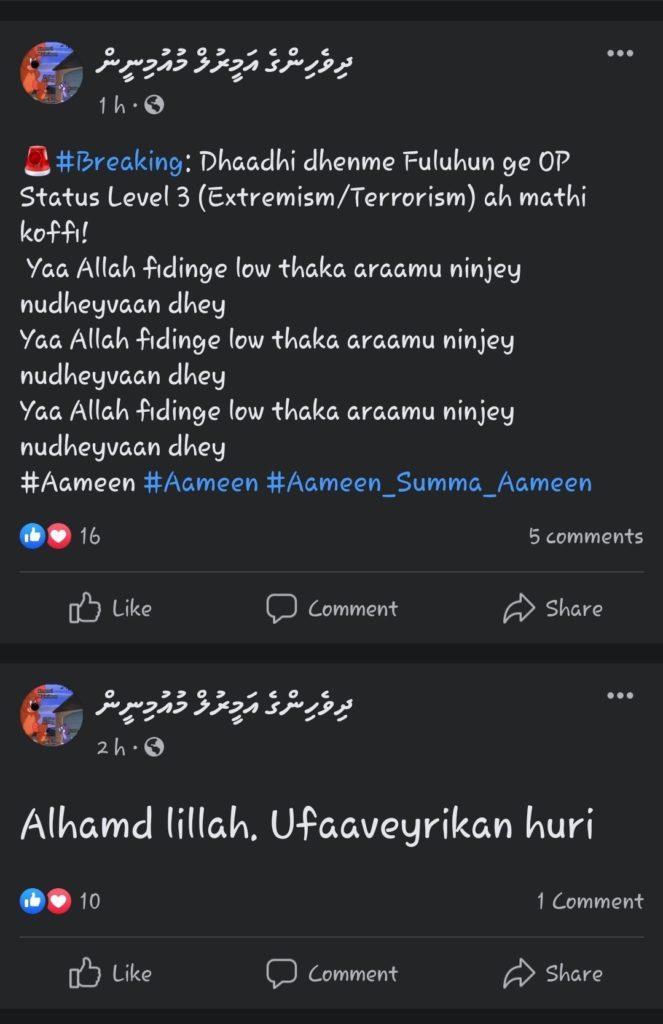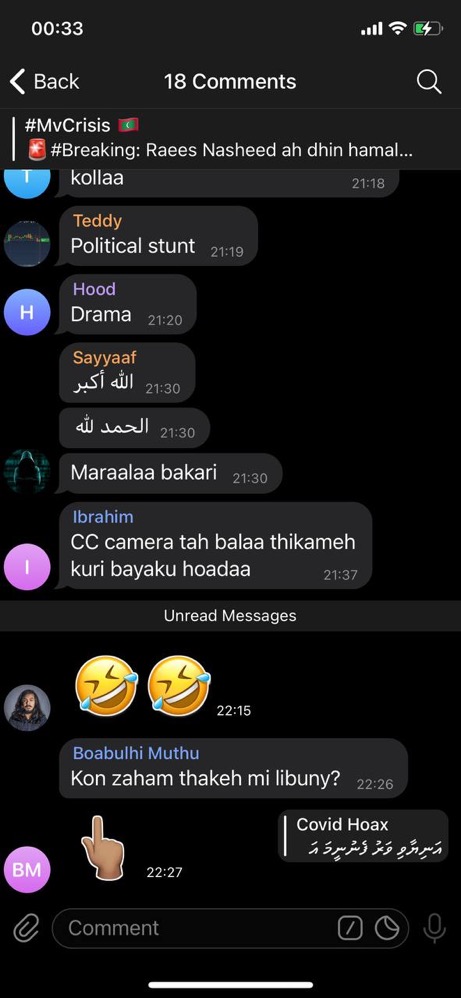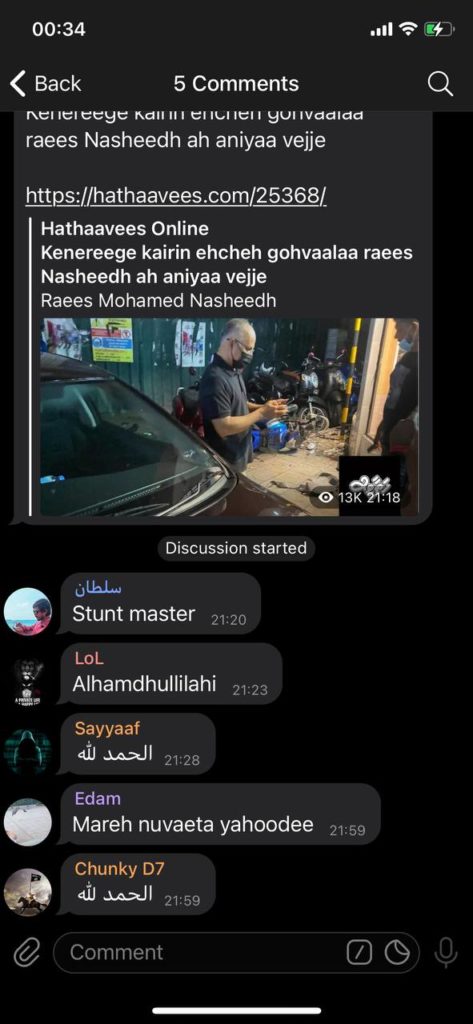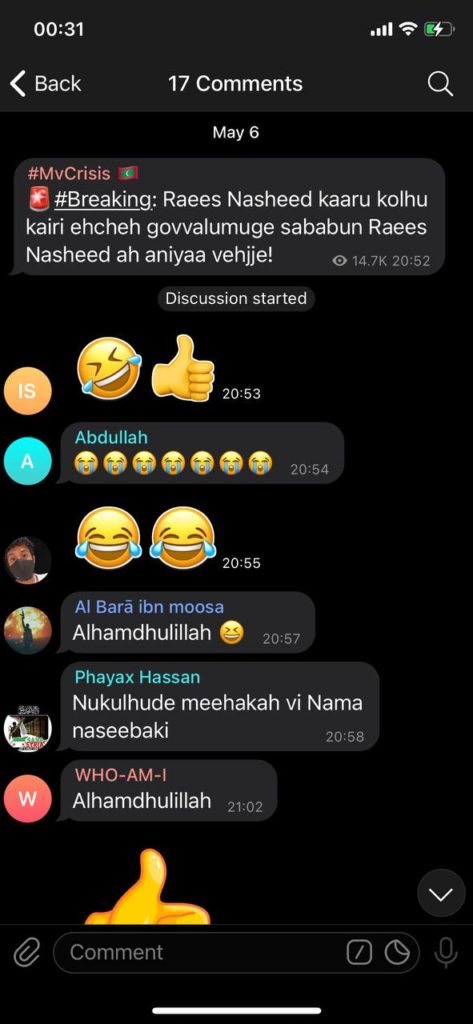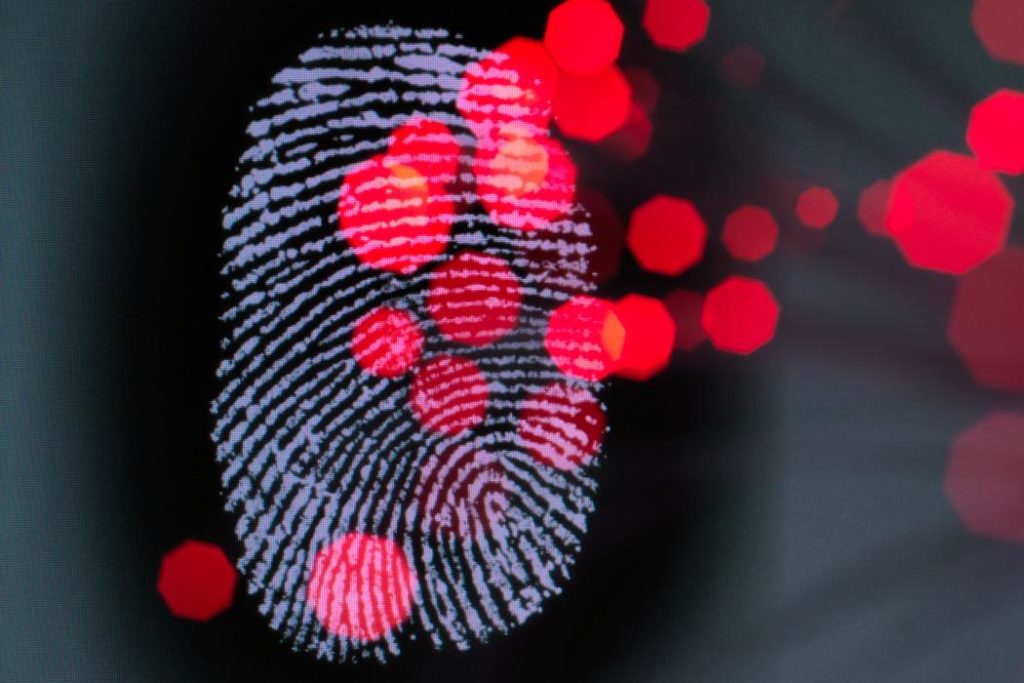Hate and Hadith in the Maldives
by Azra Naseem

Shouldn’t the right to be come before the right to criticise for being?
If Adhaalath Party wants the freedom to criticise people who are LaaDheenee, shouldn’t people first have the freedom to be LaaDheenee?
When Adhaalath Party insists that the right to criticise those they regard as LaaDheenee must exist without there first existing a right to be LaaDheenee, isn’t it essentially asking for the authority to be a vigilante religious authority or a religious police force?
If the right to call someone irreligious must be protected in order to protect freedom of speech, mustn’t we also protect the right to be irreligious? If the right to criticise non-religion must exist, must not also the right to criticise religion?
Can the right to freedom of speech exist without the right to freedom of thought? If we cannot say what we think, then what purpose does the right to speak serve?
If, as Adhaalath says, the Anti-Hate Speech Bill fails to fit UN principles and standards, what international standards and principles does criminalising of the irreligious fit into?
Many questions come to mind as I think about the Anti-Hate Speech Bill. It proposes an amendment to the Penal Code, making it a crime to call a Muslim not a Muslim. This proposition has essentially been boiled down by Adhaalath Party to mean the right to call a person or organisation LaaDheenee should the party and its affiliated clerics deem them to be so.
The word LaaDheenee is the singular most powerful word to have emerged in recent Maldivian socio-political lexicon. Dhivehi blog Mandhoob has provided a genealogy of LaaDheenee which reflects the word’s journey into the centre of modern Maldivian power politics. Having entered common Dhivehi parlance more or less at the same time as the term democracy [via Gayoom and his fellow Al-Azhar alumni] LaaDheenee has—from its original emergence as meaning irreligious—gone on to mean secularist, Enemy of Islam, apostate, and a target for Dhivehi violent extremists. The term gained most traction, and was used most frequently, when Mohamed Nasheed became president and when the opposition to his presidency was at its height. At the time, Nasheed was the premier recipient of the label, and it was used in contexts that conveyed the whole gamut of its definitions—anti-Islam; anti-religion; Bishop; Pope; Christian Missionary; Enemy of Islam.
Once Nasheed was ousted—for a large part for not being a Muslim enough leader for Maldives—the label began to be more liberally applied to any or everyone who spoke against Adhaalath and its clique of conservative clerics and friends. Adhaalath and its affiliates have denied that applying the label LaaDheenee marks people out as targets for extremists. But the facts speak for themselves. Outspoken critics of intolerant conservative Islamic practices who have been labelled LaaDheenee are all either dead, almost died, or have been evicted from society.
Now that lawmakers have finally proposed a long overdue law that will make it a crime to accuse a Muslim [which all Maldivian citizens are legally required to be from birth] of being a non-Muslim, Adhaalath has formed a new group of ‘religious intellectuals’ called 101 I’lm Verin (101 Masters of Knowledge or Masters of Kowledge 101) who have come together to re-define LaaDheenee as a label to be applied to ‘deviant’ Muslims who do not fit their criteria of a “Good Muslim”. This is a much watered-down version of what LaaDheenee has meant till now. But, for the sake of argument (and given that definitions by such ‘I’lmverin’ tend to stick), let’s go with their new definition of this very fluid term: the right to call someone LaaDheenee is merely to censure them for not being a good Muslim.
This new definition has allowed Adhaalath and affiliates to not only distance itself from the role they played in motivating and religiously justifying the killings of people they previously labelled LaaDheenee, it also provides them with the opportunity to provide backing from the Quru’an and the Sunnah for their agenda which, I believe, is to not just retain the right to be our moral police, but also to codify that right as law. The proposed Hate Speech Bill, by removing the right to call out Maldivians for not being Muslim enough, is in a sense removing Adhaalath and company their very reason for being: calling out ‘bad Muslims’ and ensuring they are punished (i.e: killed by the law of the state or killed by a pious Jihadist to purify society). These 101 Masters will, therefore, stop at very little to ensure the Bill does not become law. As usual, these men who come out in one big bearded pack to release statements and pose for group photos, are running a sophisticated and (to those who care to see), a familiar campaign based on Hate and Hadith to try and sink the Bill even before it gets to the Majlis table.
“Hisaan Bill”: making it personal
There have been many individuals in modern Maldivian society who have been picked for targeted hate campaigns which are deeply personal. Women are especially vulnerable in such situations because personal attacks against the female gender come with the additional right to criticise not just the behaviour deemed wrong but also against the women as private individuals. Challenging women, or women who challenge the status quo, are deemed fair game if their conduct is outside the invisible, yet increasingly powerful, measurements of acceptability imposed on our society by the 101 Masters. When Aishath Velezinee challenged society for disregarding Article 285 of the Constitution, she became such a target. Much of society has done the same to former Attorney General and lawyer Azima Shakoor whenever she was not on their side of the law, and it does the same to Aisha Shujune for being a Supreme Court Justice. Aishath Aniya, whose campaign for a democratic Maldives has been relentless, is often a target and, of course, Hindha Ismail of MDN (Maldivian Democracy Network) receives the same treatment. Now the time has come to add MP Hisaan Hussain to the group, and ensure all the pent-up outrage of the Masters 101 is directed at her. Avas newspaper has been particularly eager to make the bill about Hisaan, and not what it says.
Seemingly, this tactic is meant to discredit the Bill by a) making it seem like an idea proposed by someone woman and therefore inherently stupid; and b) making it seem like an idea proposed by not just a woman but also a LaaDheenee woman, and therefore not just stupid but also anti-Islamic. I would not be surprised to find out that Hisaan’s Timelines are now filled with messages of hate. There will be women falling over each other and over men to call her a slut, and to tell her go take a shower because she looks dirty, and tell her to cover herself up because she looks naked. They would be asking her how she dares live, and they would be telling her there is no room in society for her. MP Sun Siam said to Hisaan’s face what a lot of people thought: that bitch should be hanged, and I won’t even go to hell for it. But, of course, why would he? She is LaaDheenee after all.
Incredulous as it may seem, this tactic works. I am willing to bet that at least one third of the people who disagree with the Bill do so because it is proposed by some loose LaaDheenee woman who really shouldn’t be in parliament at all.
Secular Bill: Making it LaaDheenee
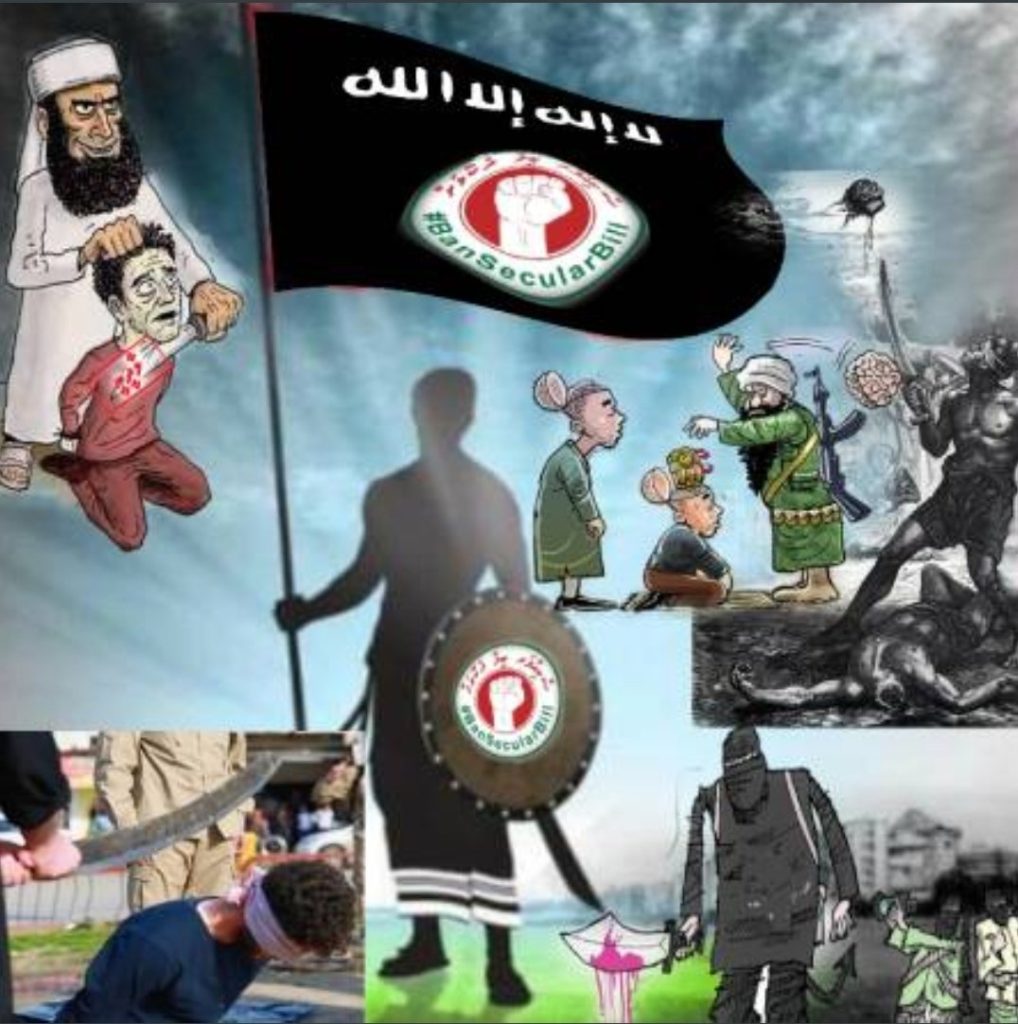
The anti-hate speech proposal is also being called the Secular Bill, even as it is being criticised by the same people for not being secular enough. On the one hand, says Adhaalath, this bill wants to introduce the secular notion of anti-hate directly against the teachings of Islam; on the other hand, also says Adhaalath, it is not secular enough in its definition of hate speech because it doesn’t allow people to call each other whatever they want. This tactic of getting people to hate the anti-hate bill on the basis that it is being introduced by closet secularists is a powerful one that resonates with a lot of Maldivians.
As the murders of Ahmed Rilwan and Yameen Rasheed showed us, secularism and any talk of reducing the predominance of religion in public spaces or of increasing tolerance of Others, are not welcome in the Maldives. This tactic also allows the 101 Masters to link the Bill with MDN, which has already been found guilty without trial of attempting to introduce secularism to the Maldives in cahoots with Western states. The fact that the government has not punished the authors of the MDN report which included sentences deemed offensive to Muslims is, according to Masters 101, the biggest challenge to Islam in the Maldives today. What they want is for the authors to be punished severely and made an example of. Secularism and people who want to relegate religion to a more private place and those who put human equality above a sense of superiority derived solely from being a Muslim, are not allowed to belong to the Maldivian society of the present.
Calling the anti-hate speech bill The Secular Bill is another tactic meant to undermine it, and get a significant section of the population behind the hate campaign that is now taking off. If, in addition to Hisaan, the hate campaign can also have the face of Hindha—and other LaaDheenee women along the way—it is assured to go ‘viral’, which is the very modern goal of these purists who want to revive the past. When the #BanMDN campaign took off, in one month there were over 200,000 Tweets of hate with the hashtag. That was just one out of about four or five months of concerted, concentrated nationwide hate from the relatively small number of Twitter users in a total population of less than half a million people. If the 101 Masters can channel that hate towards the ‘Hisaan Bill’, there is little doubt Ibrahim Mohamed Solih—whose government regards Twitter as the official barometer of public opinion—would withdraw the bill. And he may not even shed a tear.
Forbidding Evil: Making it God-given
How can there be a counter argument if what Adhaalath is fighting for is a God-given right?
The flurry of press releases, statements and social media posts Adhaalath and the 101 Masters have issued since the Bill, in addition to defining LaaDheenee people as deviant Muslims rather than as Kuffars, have all sought to do one thing: get people to see the anti-Hate Speech Bill as against Islamic teachings. The main argument put forth by these ‘intellectuals’ is that the Bill, by criminalising the right to accuse a Muslim of not being one, is obstructing the Islamic right and duty to forbid what is evil and encourage what is good. For Adhaalath, the Penal Code and the laws and regulations that already exist—supposedly based on the rule of law—are not sufficient to govern society and ensure the good conduct of citizens. For that to happen, society needs (if not instead then in addition to existing laws) Adhaalath and its 101 Masters of Knowledge to police our conduct and ensure our morality. In other words, by objecting to the anti-hate speech bill, the 101 Masters of Knowledge want to retain and increase the authority they have gained in the last decade to act as our moral police. If the right to call someone LaaDheenee is taken away from Adhaalath and supporters, there remains little reason for their being. If they cannot nahee the munkaraaiy—even if they remain free to encourage that which is good—their purpose remains insufficient.
I am not a Master of Knowledge—I lack the prerequisite beard, the Arabic and the coverings necessary to make such a claim—but I know enough about knowledge itself to be certain there is a whole world of Islamic literature, learning and jurisprudence within which are contained many arguments that challenges Adhaalath’s claim that without their surveillance and monitoring of people’s conduct, and without their enforcement of what is right and what is wrong, Maldivian Muslims cannot make a moral judgement on their own.
Why is there no room for arguments within Islam that counter what Adhaalath is saying? This is where the importance of calling the anti-hate speech bill The Secular Bill comes into play from another perspective. By making opposition to the Bill secular—which in the vocabulary of Adhaalath means anti-Islam—it shuts out any counter arguments that can be made based on less conservative interpretations of Islam and its teachings than what Adhaalath and its Salafi clerics furnish as the only understanding of Islam. That any plurality of debate or discourse from within Islam on this matter is non-existent provides definitive proof of what has been staring us in the face for a long time: Salafi and other ultra-conservative sects of Islam are not just predominant in modern Maldives, they are the only forms of religious belief allowed.
Outsourcing morality: making it about fatwas
What a pity.
For by following Adhaalath Party into believing that their interpretation of Islam and its teachings is the only way to understand and practice Islam in the Maldives, we are shutting ourselves to a whole world of Islamic thinking that is more in line with the democratic reforms this very society once fought for so passionately. Adhaalath is pushing their thinking—based on the Hadith and the Qur’an—that we cannot be allowed free will while shutting out all arguments—also based on the Hadith and the Qur’an—that say we should be allowed to exercise free will and resort to reason in our understanding of Islam itself and the world around us. Adhaalath is peddling the belief that Maldivians as Muslims must accept that they cannot by themselves, judge what is right and what is wrong—things are good because God said they are good, and things are bad because God said they are bad, regardless of the implications for the society in which they live in.
For example, Ali Rameez knows that marrying a little girl is the right thing to do because he can find justifications for it in religion—his own ethics (if there are any) matters little because what he is doing cannot be wrong. This way he feels no shame sitting smugly on television in 21stCentury Maldives telling us what is right and wrong while presenting a case for marrying a little girl or for keeping her from getting an education. Similarly, not speaking out against corruption among political and business leaders even when they are all obviously mired in it, can be explained away by saying it was not forbidden in as many words. Maybe it is easy to turn a blind eye to the MMPRC Corruption because the scandal is not explicitly mentioned in the body of knowledge to which they refer. This sort of morality, as I recently read, is very common in conservative Islamic nations where people, like the 101 Maldivian Masters of Knowledge, have shut the doors of Muslim minds to critical thinking, reason and free will.
We can leave aside for now the universal questions I asked at the beginning of this article, and leave the question of religious freedom aside for the moment. What about freedom within religion? Is even that available to Maldivians of today?
Hate critics like me that you brand secular and therefore anti-Islam if that makes you feel on higher moral ground. But instead of spending your time and energy on insulting the irreligious, if you are so interested in defending your faith, find answers from within Islam that would stop Adhaalath and these 101 Masters of Knowledge from enslaving you and us from within. Do you really want to outsource your morality to Dr Iyaz? To Zaid? Do you want Ali Rameez to decide what is right and wrong, good and evil, in the society you live in?
